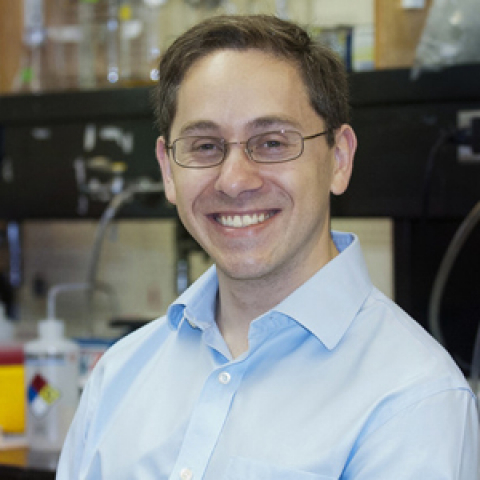Howard Salis
Associate Professor of Chemical Engineering; Associate Professor of Agricultural and Biological Engineering

-
224 Ag Engineering
University Park, PA - hms17@psu.edu
- 814-863-1931
Research Summary
Engineering microorganisms for applications in synthetic biology and metabolic engineering.
Huck Affiliations
- Bioinformatics and Genomics
- Molecular, Cellular, and Integrative Biosciences
- Center for Biorenewables
Links
Most Recent Publications
Automated Design of Oligopools and Rapid Analysis of Massively Parallel Barcoded Measurements
Ayaan Hossain, Daniel P. Cetnar, Travis L. LaFleur, James R. McLellan, Howard M. Salis, 2024, ACS Synthetic Biology on p. 4218-4232
Predicting synthetic mRNA stability using massively parallel kinetic measurements, biophysical modeling, and machine learning
Daniel P. Cetnar, Ayaan Hossain, Grace E. Vezeau, Howard M. Salis, 2024, Nature Communications
An autonomous microbial sensor enables long-term detection of TNT explosive in natural soil
Erin A. Essington, Grace E. Vezeau, Daniel P. Cetnar, Emily Grandinette, Terrence H. Bell, Howard M. Salis, 2024, Nature Communications
Autoclaving is at least as effective as gamma irradiation for biotic clearing and intentional microbial recolonization of soil
William L. King, Emily M. Grandinette, Olivia Trase, M. Laura Rolon, Howard M. Salis, Harlow Wood, Terrence H. Bell, 2024, mSphere
Automated design of protein-binding riboswitches for sensing human biomarkers in a cell-free expression system
Grace E. Vezeau, Lipika R. Gadila, Howard M. Salis, 2023, Nature Communications
Genetic circuitry boosts cell longevity
Howard M. Salis, 2023, Science on p. 343
Automated model-predictive design of synthetic promoters to control transcriptional profiles in bacteria
Travis L. LaFleur, Ayaan Hossain, Howard M. Salis, 2022, Nature Communications
Tuning Cell-Free Composition Controls the Time Delay, Dynamics, and Productivity of TX-TL Expression
Grace E. Vezeau, Howard M. Salis, 2021, ACS Synthetic Biology on p. 2508-2519
Systematic Quantification of Sequence and Structural Determinants Controlling mRNA stability in Bacterial Operons
Daniel P. Cetnar, Howard M. Salis, 2021, ACS Synthetic Biology on p. 318-332
Selenium-dependent metabolic reprogramming during inflammation and resolution
A Korwar, A Hossain, T Lee, Ashley Shay, V Basrur, K Conlon, Philip B. Smith, B Carlson, Howard M. Salis, Andrew D. Patterson, K. Sandeep Prabhu, 2021, Journal of Biological Chemistry on p. 100410
Most-Cited Papers
Rational design of a synthetic Entner-Doudoroff pathway for improved and controllable NADPH regeneration
Chiam Yu Ng, Iman Farasat, Costas D. Maranas, Howard M. Salis, 2015, Metabolic Engineering on p. 86-96
Automated physics-based design of synthetic riboswitches from diverse RNA aptamers
Amin Espah Borujeni, Dennis M. Mishler, Jingzhi Wang, Walker Huso, Howard M. Salis, 2016, Nucleic Acids Research on p. 1-13
Precise quantification of translation inhibition by mRNA structures that overlap with the ribosomal footprint in N-terminal coding sequences
Amin Espah Borujeni, Daniel Cetnar, Iman Farasat, Ashlee Smith, Natasha Lundgren, Howard M. Salis, 2017, Nucleic Acids Research on p. 5437-5448
Simultaneous repression of multiple bacterial genes using nonrepetitive extra-long sgRNA arrays
Alexander C. Reis, Sean M. Halper, Grace E. Vezeau, Daniel P. Cetnar, Ayaan Hossain, Phillip R. Clauer, Howard M. Salis, 2019, Nature Biotechnology on p. 1294-1301
A portable expression resource for engineering cross-species genetic circuits and pathways
Manish Kushwaha, Howard M. Salis, 2015, Nature Communications
Reversing methanogenesis to capture methane for liquid biofuel precursors
Valerie W.C. Soo, Michael J. McAnulty, Arti Tripathi, Fayin Zhu, Limin Zhang, Emmanuel Hatzakis, Philip B. Smith, Saumya Agrawal, Hadi Nazem-Bokaee, Saratram Gopalakrishnan, Howard M. Salis, James G. Ferry, Costas D. Maranas, Andrew D. Patterson, Thomas K. Wood, 2016, Microbial Cell Factories on p. 11
An automated model test system for systematic development and improvement of gene expression models
Alexander C. Reis, Howard M. Salis, 2020, ACS Synthetic Biology on p. 3145-3156
Translation Initiation is Controlled by RNA Folding Kinetics via a Ribosome Drafting Mechanism
Amin Espah Borujeni, Howard M. Salis, 2016, Journal of the American Chemical Society on p. 7016-7023
Automated design of thousands of nonrepetitive parts for engineering stable genetic systems
Ayaan Hossain, Eriberto Lopez, Sean M. Halper, Daniel P. Cetnar, Alexander C. Reis, Devin Strickland, Eric Klavins, Howard M. Salis, 2020, Nature Biotechnology on p. 1466-1475
A Biophysical Model of CRISPR/Cas9 Activity for Rational Design of Genome Editing and Gene Regulation
Iman Farasat, Howard M. Salis, 2016, PLoS Computational Biology on p. e1004724
News Articles Featuring Howard Salis
Sep 11, 2024
Three projects receive Huck Innovative and Transformational Seed Fund grants
Three potentially high-impact, high-risk research projects have been selected to receive seed funding for the latest round of the Huck Innovative and Transformational Seed (HITS) Fund initiative.
Full Article
May 31, 2023
Penn State engineers report low-cost human biomarker sensor designs
Penn State researchers have developed a low-cost, RNA-based technology to detect and measure biomarkers, which can help decode the body’s physiology.
Full Article
May 08, 2023
Scientists Nearly Doubled Yeast Cells’ Longevity With a Clever Genetic Hack
While human aging is the result of many interconnected processes, one of the most fundamental is the natural deterioration of individual cells. Now researchers have shown that they can use synthetic biology to significantly extend the lifespan of yeast cells.
Full Article
May 03, 2023
Chinese researchers at UCSD help discover way to potentially increase lifespan by 82%
A team of scientists at the University of California, San Diego (UCSD), has discovered a way to potentially slow down the aging process by up to 82%.
Full Article
Apr 27, 2023
Biological Clocks Have Been 'Rewired' to Increase Lifespan by 80 Percent
What if it was possible to stop the biological clock or at least rewire it?
Full Article
Jul 21, 2020
Researchers offer solution for one of synthetic biology's biggest problems
A team of Penn State and University of Washington researchers recently developed a new algorithm to help prevent the failure of engineered genetic systems, or organisms engineered to have new capabilities.
Full Article